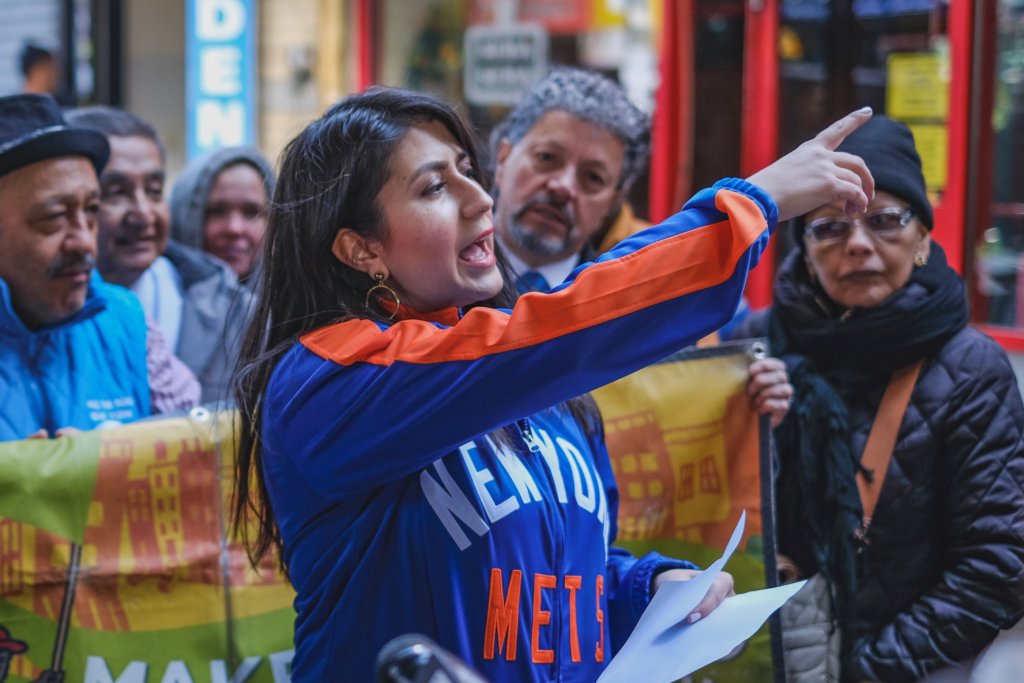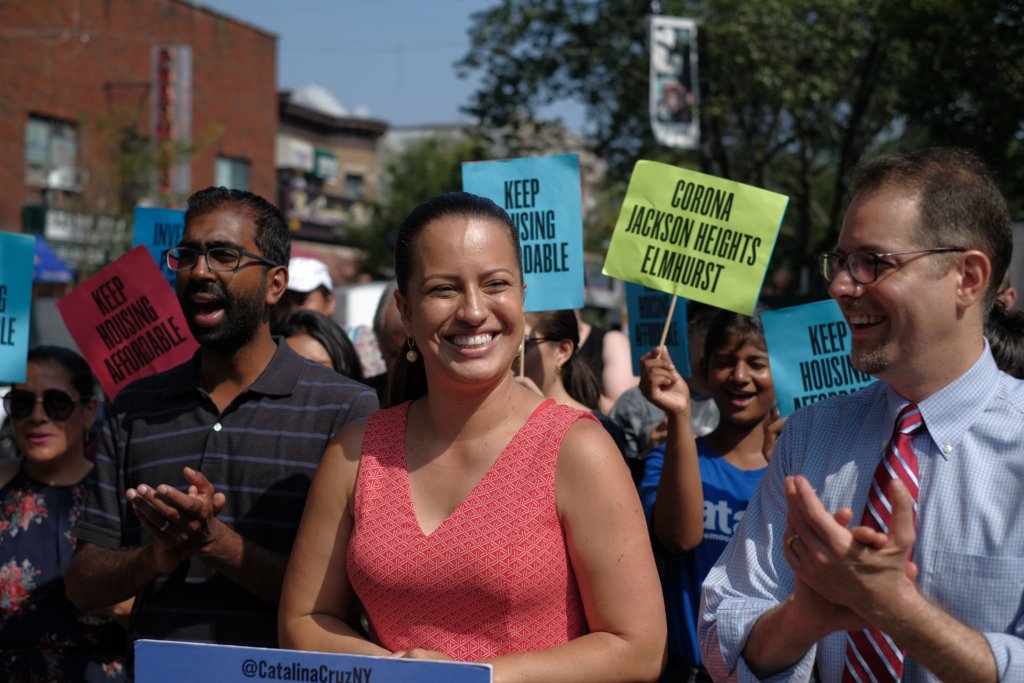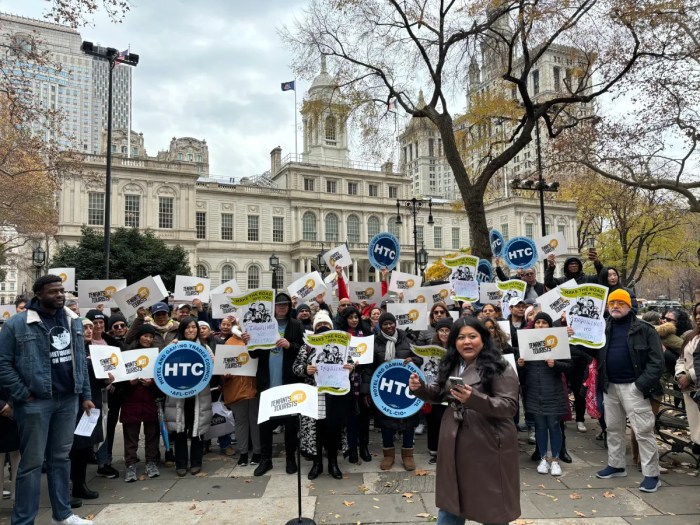As 2018 drew to a close, dust settled on a new landscape in New York City politics that overthrew the status quo with Queens at the epicenter of it all.
The rise of Latina women from Queens drew the eye of the nation and marked a new chapter for legislative progress in New York with the election of State Senator Jessica Ramos, Assemblywoman Catalina Cruz and Congresswoman Alexandria Ocasio-Cortez.
As controversy over the Independent Democratic Committee — a break-away group of eight who negotiated with the Republican majority — divided the left in Albany, Ramos took it upon herself to unseat the IDC official in her district, the late state Senator Jose Peralta.
Ramos emerged at the top in the Democratic primary of 2018 and was part of a successful movement to oust perceived turncoats and win back the majority.
Since her victory, Ramos has turned her office into a machine to fight for the rights of sex workers.
After leading the discussion in Queens as well as conducting a walking tour of Roosevelt Avenue, Ramos has unveiled legislation on June 10 to decriminalize sex work and take a bite out of human trafficking.

“Decriminalizing sex work between consenting adults in New York will protect many of my neighbors — people who have found themselves in situations because of employment and housing discrimination,” Ramos said. “We will finally make strides against trafficking by empowering sex workers to report violence against them. Sex work is work and everyone has an inherent right to a safe workplace.”
Ramos came from a family of Colombian immigrants who struggled with maintaining their lives in the United States. her father, Auribal Ramos, had once been snatched up in an immigration raid while working in a New Jersey factory. Her mother made her way across the Mexican border in a grueling four-day trek on foot.
Catalina Cruz, who migrated here from Colombia, also fell into politics through her experiences of hardship throughout her experience in the United States.
Cruz lived undocumented for many years before she finally gained her citizenship and became a legislator in 2019. But along the way she would become and attorney and Chief-of-Staff for former city Councilwoman Julissa Ferreras-Copeland.

After Peralta died suddenly of leukemia in November weeks after losing his seat to Ramos, he would be honored with the DREAM Act, which opens state tuition assistance to undocumented immigrants, being named in his honor.
In March, as the Jose Peralta DREAM Act reached the floor of both houses in Albany, Cruz gave a tearful salute to Peralta and “DREAMers” who struggle for social mobility.
“I had to work two or three jobs, my mother had to work two or three jobs so that I could be here one day as your colleague and now the DREAMers don’t have to go through that anymore,” Cruz said in the Assembly chamber the day the DREAM Act was passed. “Today, we tell DREAMers: we see you, we love you and we will fight for you.”
Cruz also has legislation introduced in both houses that would make it illegal to levy unreasonable fees on tenants to have keys replicated.
But the success of these two legislators all started with the unlikely victory of Ocasio-Cortez over a seeming political giant: Joe Crowley.
Ocasio-Cortez used social media and aggressive door-knocking to spread the word of her intent to defeat Crowley across Queens and her native Bronx in the months leading up to the June 2018 primary and shocked the nation when she came through with the majority of votes.

After springing the nearly 20-year incumbent from the seat and position as the fourth most powerful Democrat in Congress, Ocasio-Cortez struggled with acceptance from her Democratic peers in congress almost as much as she did with the Republicans.
Since then, Ocasio-Cortez has taken a lead role in the discussion of climate change in congress with the introduction of the Green New Deal.
Though it failed to gain support in Washington D.C., the initiative to rejigger the labor economy around green infrastructure became a template for municipalities across the country, including New York City.
In April, Mayor Bill de Blasio announced the NYC Green New Deal would create jobs by putting caps the amount of emissions buildings are allowed to produce. Building owners could face fines of up to $1 million per year for violations.
De Blasio’s version of the initiative, passed into law, would bring about sweeping changes to the way the city gets its power. Instead of electricity produced from petroleum plants such as ones in Astoria, the city would turn to hydroelectric power, not generally accepted as renewable, produced in Canada.
Although 2018 saw distinct victories for women of color in government, 2019 would turn out to be the baptism by fire for these first-time legislators.
And it is not over yet.
Queens continues to prove itself to be the epicenter of progressive action in not only government, but criminal justice.
The crowded field for Queens district attorney had seven candidates including Tiffany Cabán, a Democratic Socialists of America member who is pushing some of the most far left justice reforms to make major headlines who emerged at the top of the polls on election night.
Cabán, of Puerto Rican descent, is a Queer Latina from southeast Queens pushing for decarceration to a controversial level. She spent seven years as a public defender before announcing her run at 31.
Her platform included declining to prosecute a number of crimes from marijuana possession, turnstile jumping to sex work making Cabán the most progressive candidate in the race and winning nationwide attention.
Although doubts were cast regarding her age and only seven years of courtroom experience, Cabán teased detractors at her victory party saying over the microphone, “But we did it, y’all.”
With the majority of the precincts reporting 39.6 percent of votes in Cabán’s favor on primary night, the borough continues in what seems to be a cycle of change.
The June 25 primary for DA also featured retired Judge Gregory Lasak, Borough President Melinda Katz, Councilman Rory Lancman, Mina Malik, Jose Nieves and Betty Lugo.




































